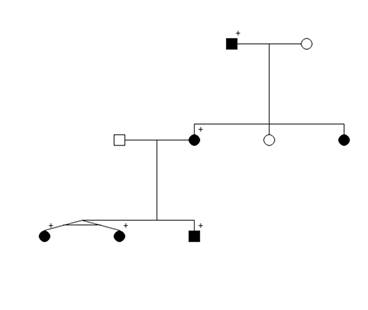Objective: We describe the clinical heterogeneity of a Danish family with complex dystonia and a variant in KMT2B not previously reported.
Background: Heterozygous mutations in the lysine-specific histone methyltransferase 2B gene, KMT2B, (OMIM 606834) are associated with complex early onset dystonia with a wide range of symptoms and variable expression. Besides dystonia, other described clinical features are intellectual disability, psychiatric co-morbidity and dysmorphic features.
Method: Exome sequencing of the proband (most severely affected twin), her monozygotic twin sister, and their parents was performed. Data were analyzed as trio-exome (proband and parents). Custom sanger sequencing for the KMT2B variant was used for segregation analysis.
Results: A novel missense variant, KMT2B(NM_014727.2):c.2237C>T,p.(Thr746Ile) was identified in the proband, her twin sister, their mother, brother and maternal grandfather. The variant segregated with a phenotype compatible with DYT-KMT2B in the family.
The proband is a 19-year-old woman with severe generalized dystonia, spastic paresis and intellectual disability. She reached early motor milestones with slight delay. Her dystonia progressed rapidly after a severe infection at the age of 12 years. She went from slight lower limb dystonia to generalized dystonia and lost her ability to ambulate within a couple of years. She has had no or little effect of deep brain stimulation and anti-dystonic drugs. Development and symptomatology was similar in her monozygotic twin until the age of 12 years. The twin sister has since had slowly progressing symptoms, with only intellectual disability, anxiety and mild generalized dystonia. Their brother has psychiatric symptoms with hallucinations, anxiety, mild dystonia combined also with intellectual disability. Their mother has discrete dystonia and the mother’s father has a mild tremor. MRI showed slightly enlarged ventricles, no specific findings.
Conclusion: We present a family with KMT2B related dystonia. The novel variant, p.Thr746Ile, segregated with the phenotype, and is evaluated to be the likely cause of the complex dystonia in the affected individuals. A substantial clinical heterogeneity was seen. Notably, one monozygotic twin was very severely affected, while the other had milder symptoms. We suggest, that environmental factors as in this case a severe infection may be important elements in explaining the variable phenotype in DYT-KMT2B.
To cite this abstract in AMA style:
O. Mcwilliam, C. Fagerberg, M. Larsen, D. Kondiziella, I. Havsteen, A. Løkkegaard. Clinical heterogeneity of DYT-KMT2B mutation in a family with monozygotic twins [abstract]. Mov Disord. 2021; 36 (suppl 1). https://www.mdsabstracts.org/abstract/clinical-heterogeneity-of-dyt-kmt2b-mutation-in-a-family-with-monozygotic-twins/. Accessed April 22, 2025.« Back to MDS Virtual Congress 2021
MDS Abstracts - https://www.mdsabstracts.org/abstract/clinical-heterogeneity-of-dyt-kmt2b-mutation-in-a-family-with-monozygotic-twins/

